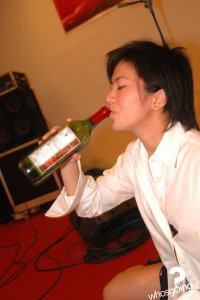Despite a 4,600-year wine history, booming nation is just discovering good vino
BEIJING - The history of Chinese grape wine dates back more than 4,600 years. But if you are in the country during this Olympic year, I suggest you drink beer.
Back last week from a three-week sojourn through China, I discovered there are only a couple of wines approaching entry-level international standards.
There is no question China will eventually produce some world-class winners. The country has the climate, the soil and the will-power to rival the world's top wine-producing regions. And international expertise is arriving with state-of-the equipment.
But the wine industry has not kept up with the quality strides made in other industries, from manufacturers of high-tech equipment to leather goods to clothing.
One reason China is behind most of the world's best wine-producing regions in quality is that many of its 1.3 billion people haven't been able to afford such a luxury drink. Just getting enough food to stay alive during famines can be a huge endeavour. It's a rather sad situation given the country's long history of winemaking -- in 1995, Chinese and American archeologists discovered remnants of alcoholic beverages, including grape, mead and several mixed beverages, that dated back some 4,600 years.
Another handicap was that Chinese grapes, for centuries, were of inferior quality compared to those cultivated around the Mediterranean and later in Europe. Consequently, wine didn't enjoy the same popularity in China as in other parts of the world. Then, during the Han Dynasty, following a gentleman by the name of Zhang Qian's exploration of the country's western region in the second century BC, high-quality grapes were introduced.
Fast forward to 1989, just shortly after the Tiananmen Square massacre, I visited Beijing and befriended a local university student who was keen on wine. I was delighted one night when he rushed from a restaurant (with my cash) and returned with a pretty decent bottle of French-influenced Riesling.
French wine was the first foreign wine to be imported into China and in 1980, at the beginning of Chinese economic reform, Remy Martin arrived to set up some joint ventures.
I licked my lips recently at the thought of tasting 20 years of viticulture progress. Consider the progress the B.C. wine industry has made in that time.
But sadly, I was disappointed. For the most part, the same few brands are sold throughout the country. Only in top international hotels in such cities as Beijing and Shanghai could one find French, Australian and perhaps some Californian wine.
But who wants to drink wine so readily found at home? It was in ancient, cobble-streeted Lijiang, in the province of Yunnan and near the Burma border, that I sat down one night to sample wines found in most restaurants in the region. Some notes:
Dynasty Red Wine, $4. A quite quaffable wine made with French help. Dry, light and well-balanced, but the fruit was more faded-savoury than forward.
Yunnan Red Wine, $4. A local wine, drinkable if one has been stranded in the local mountains for about a year.
Great Wall Red Wine, $3.75. Found everywhere and selling to westerners on its novelty name. The wine tasted oxidized. But it's a "must-try" to say you have sampled Chinese wine.
Tibetan Dry Naked Barley Red Wine, $4.50. Caramel, dried figs and plums on a wine that deserved a second sip.
Lijiang Red, $3. Some licorice notes in this local wine what tasted like a cross between sherry and firewater.
Beer is the chosen beverage of most males. Some 90 per cent of the wine consumed domestically in China last year however was red. Drinking it has become a status symbol.
Some 80 per cent of vineyards produce red wine. It's the country's women who are driving a slowly growing white-wine market.
The Chinese have undoubtedly noted wine is a key export in some countries and within a decade I believe we will be sipping good Chinese wine.
That's just as well. The standard of living there is rising quickly and a more affluent population will no doubt seek a share of our favourite wines.
Nick Lees
skip to main |
skip to sidebar
Enhance the pleasure that you get from wine by sharing your experiences, knowledge, news articles and facts about the elixir of the gods and bacchanalia on earth by emailing: bacchusforyou@bellsouth.net
How Much Did The Best Bottle of Wine You Ever Drank Cost?
CONTACT INFORMATION
TO SUBMIT A POST, TO BE PUT ON THE MAILING LIST, TO HAVE QUESTIONS ANSWERED, ETC.
EMAIL:



